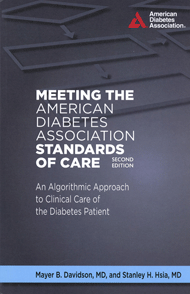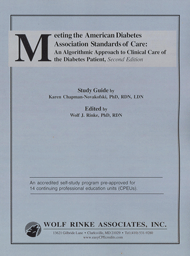Meeting the American Diabetes Association Standards of Care: An Algorithmic Approach to Clinical Care of the Diabetes Patient, Second Edition
Book by Mayer B. Davidson, MD and Stanley H. Hsia, MD
Study Guide by Karen Chapman-Novakofski, PhD, RDN, LDN
| C331 |
14 CPEUs |
HARD COPY |
$154.95 |
|
Course Expires: 5/31/2024
Book, 165 pgs and Study Guide with 1 Reporting Form, 25 pgs.
Delineates detailed treatment algorithms that have been shown to be clinically effective in improving outcomes in people with diabetes. More specifically you will discover how to:
- Apply knowledge of pre-prandial and post-prandial blood glucose fluctuations during insulin and oral medication therapy to client care;
- Integrate knowledge of insulin actions into overall glycemic management;
- Integrate nutritional considerations of blood pressure and cardiovascular medications into diabetes care plans;
- Apply an understanding of blood glucose monitoring to effective treatments in the algorithm of care;
- Integrate knowledge of medications’ propensity to cause hypoglycemia into counseling, monitoring, and treatment plans.
For more information and customer comments, click
here.
Approved/Accepted by CDR, NCBDE
For RDs/RDNs & DTRs/NDTRs for the Professional Development
Portfolio
SUGGESTED Performance Indicators (PIs):
6.1.4, 6.3.6, 8.1.1, 8.1.2, 8.1.5, 8.3.1, 8.3.6, 10.1.1, 10.1.2, 10.1.3, 10.2.1, 10.2.2, 10.2.3, 10.2.4, 10.2.5, 10.2.7, 10.2.9, 10.3.2, 10.4.1, 10.4.2, 10.4.3, 12.4.6
DON'T SEE your Performance Indicators Listed here?
There are many Performance Indicators (PIs) that are applicable we can't list them all &
Per CDR you may use ANY PI as long as it relates to your Learning Plan.
For details click here.
Share with a friend and Save! Click here for important information about
sharing.
To order an ADDITIONAL Reporting Form click below:
C331F |
14 CPEUs |
REPORTING FORM |
$60.00 |
|
Meeting the American Diabetes Association Standards of Care An Algorithmic Approach to Clinical Care of the Diabetes Patient, Second Edition
Book by Mayer B. Davidson, MD and Stanley H. Hsia, MD
Study Guide by Karen Chapman-Novakofski, PhD, RDN, LDN
Copyright 2019 Wolf Rinke Associates. All rights reserved for
this self-directed, accredited learning program. Reproduction in whole
or part without written permission from the publisher is prohibited.
OVERVIEW AND INSTRUCTIONS
Welcome to the pre-approved, accredited CPE program for Meeting the American Diabetes Association Standards of Care—An Algorithmic Approach to Clinical Care of the Diabetes Patient, Second Edition. The program consists of a book of the same title by Mayer B. Davidson, MD and Stanley H. Hsia, MD and this study guide. This CPE program is designed to help you care for people with diabetes in achieving glycemic, blood pressure, and low-density lipoprotein (LDL) goals. It is also designed to help you earn 14 Level 2, Continuing Professional Education Units (CPEUs).
To get the most out of this CPE program, it is suggested that you adhere to the following four steps:
- Review the objectives in this study guide.
- Read and study the book.
- Assess what you have learned by answering the self-assessment questions in this study guide.
- Compare your answers to the answer key, which you will find at the end of the study guide. If you scored at least 80% (60 questions) correct, you have completed the program and are ready to transfer your answers to the CONTINUING PROFESSIONAL EDUCATION REPORTING FORM in front of this study guide. If you scored less than 80% correct, re-read the appropriate sections of the book and re-test yourself until you score at least 80% (60 questions) correct.
After you have successfully completed the program, complete the CPE REPORTING FORM and:
Submit online at www.easyCPEcredits.com,
Or fax to (410) 531-9282,
Or mail to Wolf Rinke Associates, 721 Valley Forge Road #486, Valley Forge, PA 19481
Upon receipt of your CPE Reporting Form, we will email you a Certificate of Completion
within 3-5 business days.
When you submit your CPE Reporting Form to us via www.easyCPEcredits.com, fax, or mail be sure to write your correct email address in the space provided on the CPE Reporting Form. If writing by hand, be sure to print your email address clearly.
To ensure that our emails are delivered to your inbox (instead of your junk/spam folders), please add cpesupport@wolfrinke.com to your Address Book or Safe List of allowed email senders. Also, be sure to allow attachments from this email address.
LEARNING OBJECTIVES
Upon completion of this CPE program you will be better able to:
- Apply research findings when counseling clients about treatment for diabetes;
- Communicate the rationale for glycemic, blood pressure, and low-density lipoprotein (LDL) goals;
- Apply treatment algorithms for caring for people with diabetes;
- Integrate research evidence into counseling clients on lifestyle changes for the management of diabetes;
- Formulate appropriate caloric goals relative to weight management;
- Apply macronutrient recommendations to counseling plans;
- Integrate physical activity recommendations into client care plans;
- Integrate nutritional considerations of oral medications for diabetes into counseling sessions;
- Apply knowledge of pre-prandial and post-prandial blood glucose fluctuations during insulin and oral medication therapy to client care;
- Integrate knowledge of insulin actions into overall glycemic management;
- Apply knowledge of hypercholesterolemia and hypertriglyceridemia to strategies for the management of cardiovascular risk factors for those with diabetes;
- Integrate sodium reduction strategies into blood pressure management for those with diabetes;
- Integrate nutritional considerations of blood pressure and cardiovascular medications into diabetes care plans;
- Apply an understanding of blood glucose monitoring to plans for determining effective treatments in the algorithm of care;
- Integrate knowledge of medications’ propensity to cause hypoglycemia into counseling, monitoring, and treatment plans.
TABLE OF CONTENTS
Chapter 1: Laying the Groundwork
Background for Evidence-Based ADA Guidelines for Standards of Diabetes Care Glycemia
Dyslipidemia
Nephropathy
Hypertension
Retinopathy
Peripheral Neuropathy and Foot Examination
Aspirin
Smoking Cessation
Rationale for Using Treatment Algorithms
Chapter 2: Evidence-Based Principles of Nonpharmacological Therapy
Diabetes Self-Management Education and Support (DSME/DSMS)
Medical Nutrition Therapy
Total Calories and Weight Control
Dietary Carbohydrates
Dietary Fat
Dietary Protein
Overall Macronutrient Composition
Micronutrients, Alcohol, and Dietary Supplements Physical Activity
Physical Activity
Chapter 3: Glycemia
Goals of Therapy
Principles of Treatment
Use of Noninsulin Drugs
Metformin (Glucophage, Glumetza)
Sulfonylurea Agents and Glinides
Thiazolidinediones (Glitazones)
Incretins
SGLT-2 Inhibitors
a-Glucosidase Inhibitors
Amylin Mimetics
Bile Acid Sequestrants
Dopamine-2 Agonist
Treatment of Markedly Symptomatic, Newly Diagnosed Patients with Type 2 Diabetes
Combination Pills
Self-Monitoring of Blood Glucose Insulin
Insulin Preparations
Principles of Adjusting Insulin Doses
Multiple-Injection Insulin Regimens: General Considerations
Chapter 4: Dyslipidemia
Hypercholesterolemia and ASCVD
Principles of Hypercholesterolemia Treatment
Hypertriglyceridemia and ASCVD
Hypertriglyceridemia and Pancreatitis
Principles of Hypertriglyceridemia Treatment
Dyslipidemia Algorithm
Chapter 5: Hypertension
Hypertension and Diabetes Complications
Principles of Hypertension Treatment
ACE Inhibitors
Angiotensin Receptor Blockers (ARBs)
Thiazide and Loop Diuretics
Calcium Channel Blockers
Direct Vasodilators
Adrenergic Receptor Antagonists (Blockers)
Aldosterone Receptor Antagonists (Potassium-Sparing Diuretics)
Direct Renin Inhibitors
Adrenergic Receptor Agonists (Central and Peripheral Sympatholytics)
Adrenergic Receptor Antagonists
Hypertension Algorithm
Appendix: Self- Titration Instructions for Patients
ABOUT THE AUTHOR OF THE STUDY GUIDE
Karen Chapman-Novakofski, PhD, RDN earned her bachelor’s degree from the University of Illinois at Urbana-Champaign, her master’s degree from Eastern Illinois University, and her doctorate from the University of Illinois at Urbana-Champaign. She completed her dietetic internship at the University of Alabama in Birmingham, was a dietitian at the VA Medical Center in Danville, Illinois for 11 years, has been at the University of Illinois at Urbana-Champaign in the College of Medicine since 1983, and in the Department of Food Science and Human Nutrition and Division of Nutritional Sciences since 1991. She participated in a test item writer workshop sponsored by the Commission on Dietetic Registration (CDR).
As a Professor, Dr. Chapman-Novakofski has written more than 300 abstracts, proceedings, and journal publications as well as twelve book chapters. She has received many national awards, including Outstanding Research Paper Award from the American Dietetic Association Diabetes Care and Education Practice Group; the Abbott Award for Women’s Health, American Dietetic Association Foundation; the Mary Abbott Hess Award for Innovation in Education for the Your Guide to Diet and Diabetes website from the Academy for Nutrition and Dietetics Foundation; the Excellence in Nutrition Education Award from the American Society for Nutrition; and the Excellence in Community Nutrition award from the Academy of Nutrition and Dietetics.
Dr. Chapman-Novakofski has served in several leadership positions such as past chair of the Nutrition Education for the Public Practice Group and has been a member of the Research DPG and the Diabetes Care and Education DPG for 20 years.
ABOUT THE EDITOR OF THE STUDY GUIDE
Wolf J. Rinke, PhD, RDN is the president and founder of Wolf Rinke Associates, a company that has provided high-quality CPE programs to nutrition and dietetics practitioners since 1990.
Dr. Rinke earned a BS at Drexel University, an MS at Iowa State University, a PhD in Continuing and Vocational Education (Adult Ed) at the University of Wisconsin and interned at Walter Reed Army Medical Center. He participated in a test item writer workshop sponsored by the Commission on Dietetic Registration (CDR).
Dr. Rinke is a past Adjunct Associate Professor, Graduate School of Management & Technology at the University of Maryland, and a former Adjunct Faculty Member of the School of Continuing Studies at The Johns Hopkins University. He has served as past president of the District of Columbia (DC) Dietetic Association and has been honored by the Academy of Nutrition and Dietetics with the Award for Excellence in the Practice of Management, the Outstanding Dietitian of the Year Award, and the Outstanding Service Award, in addition to delivering the Lenna Frances Cooper Lecture.
Dr. Rinke has served in numerous leadership roles at the Academy of Nutrition and Dietetics: Chair of the Scholarship Committee for Dietitians in Business and Communications; Chair of the Communication Committee, Honors Committee, and Licensure Panel and Ethical Practices Task Force for the Commission on Dietetic Registration; Chair of the Area Coordinating Committee and Chair for the Code of Ethics; Member of the Resource for Education Programs Committee; Member of the House of Delegates; and Member of the Board of Directors.
Dr. Rinke is the author of more than 500 articles, numerous CPE self-study programs, and several popular books including Make It a Winning Life: Success Strategies for Life, Love and Business; Winning Management: 6 Fail-Safe Strategies for Building High-Performance Organizations; and Don’t Oil the Squeaky Wheel, and 19 Other Contrarian Ways to Improve Your Leadership Effectiveness.
ACKNOWLEDGEMENTS
Special thanks to the following individuals for their careful review of this CPE program.
Martha Archuleta, PhD, RDN
Professor- Nutrition, Dietetics & Food Sciences Dept.
Director- Master of Dietetics Administration Program
Utah State University
Salt Lake Center, UT
Anne Coltman, MS, RD, LDN, CNSC
Patient Services Manager
Trinity Health
Berwyn, IL
Josephine Umoren, PhD
Associate Professor & Coordinator, Nutrition & Dietetics
School of Health Studies
Northern Illinois University
DeKalb, IL
Return to the top of page
If you prefer to order by phone, mail
or fax click below
or click here to contact us with
other questions.
For information about our other products and
services return to the sidebar at the top of the page.
|



